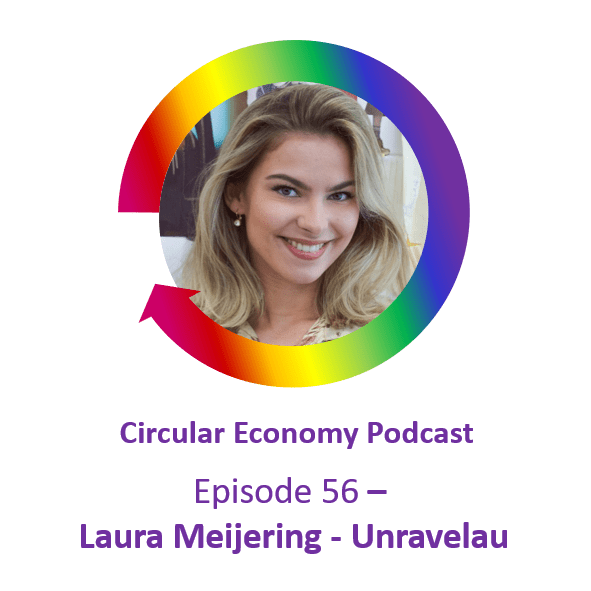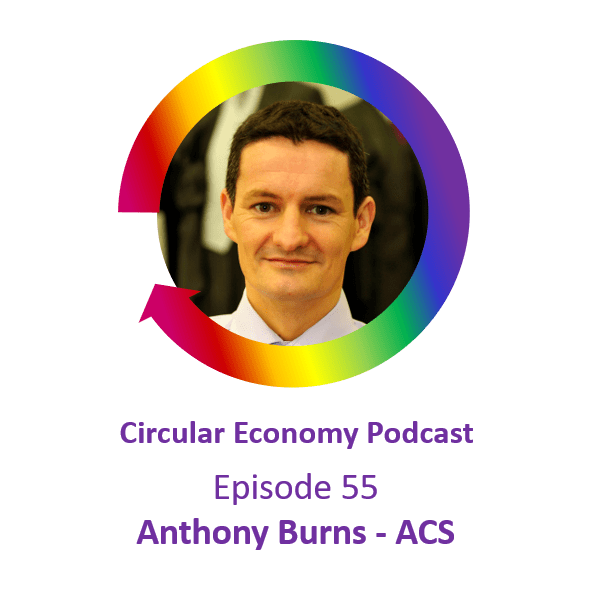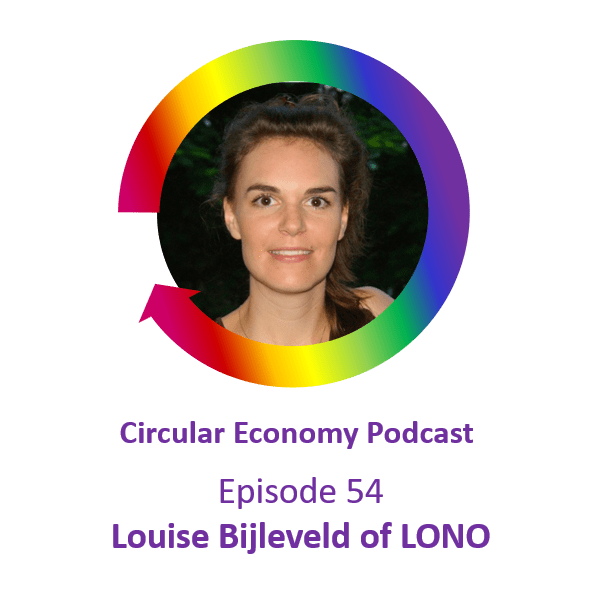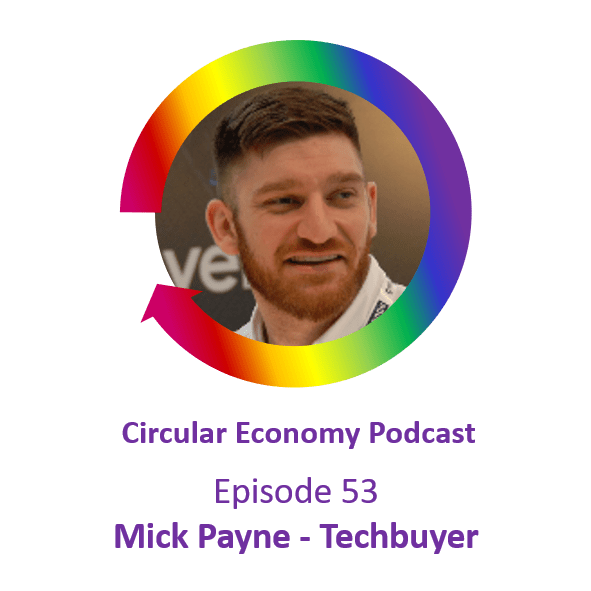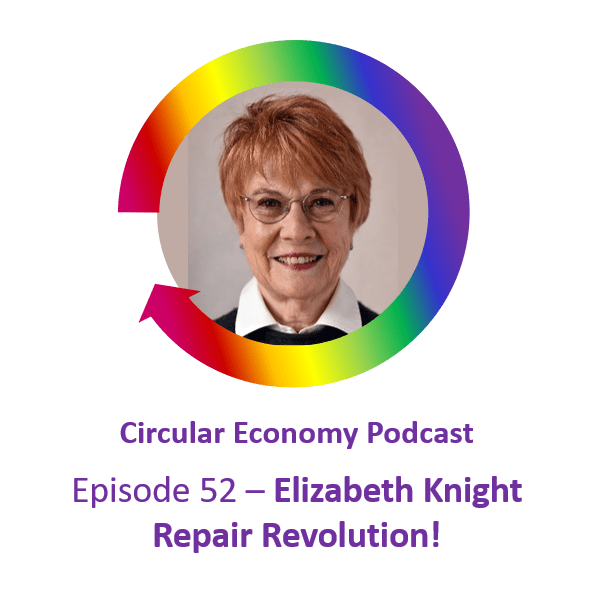Podcast: Play in new window | Download
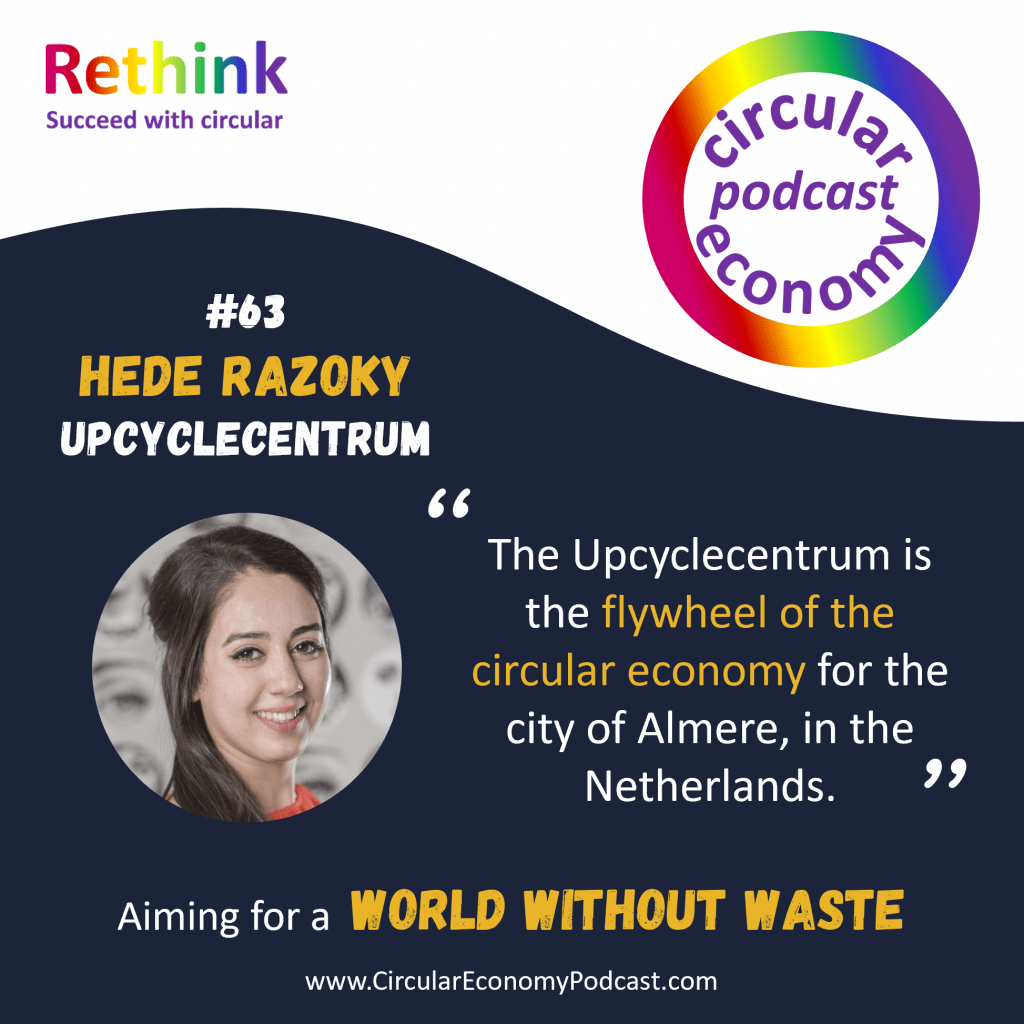
In this podcast, Hede Razoky talks to Catherine Weetman about the Upcyclecentrum in Almere, in the Netherlands.
The Upcyclecentrum is a brilliantly simple way for a town to support circular entrepreneurs, improve recycling rates and help its citizens see how the circular economy supports people, planet and prosperity.
The Upcyclecentrum has three elements: [1] it’s a recycling centre for local citizens, [2] it has an ‘experience room’ made from upcycled materials, for use by local businesses and community groups, and [thirdly] it has a brilliant entrepreneur incubation programme… providing facilities, materials and other support to artisan businesses that turn local waste materials into desirable, high-value products.
As the account manager for the Upcyclecentrum, Hede Razoky has a strong focus on creative entrepreneurship and making connections, for a shared goal of a ‘world without waste’.
Podcast host Catherine Weetman is a circular economy business advisor, workshop facilitator, speaker and writer. Her award-winning book: A Circular Economy Handbook: How to Build a More Resilient, Competitive and Sustainable Business includes lots of practical examples and tips on getting started. Catherine founded Rethink Global in 2013, to help businesses use circular, sustainable approaches to build a better business (and a better world).
Stay in touch for free insights and updates…
Don’t forget, you can subscribe to the podcast series on iTunes, Google Podcasts, PlayerFM, Spotify, TuneIn, or search for “circular economy” in your favourite podcast app. Stay in touch to get free insights and updates, direct to your inbox…
You can also use our interactive, searchable podcast index to find episodes by sector, by region or by circular strategy. Plus, there is now a regular Circular Economy Podcast newsletter, so you get the latest episode show notes and links delivered to your inbox on Sunday morning, each fortnight. The newsletter includes a link to the episode page on our website, with an audio player. You can subscribe by clicking this link to update your preferences.
Links we mention in the episode:
- A Circular Economy Handbook: How to Build a More Resilient, Competitive and Sustainable Business – buy from any good bookseller, or direct from the publisher Kogan Page, which ships worldwide (free shipping to UK and US) and you can use discount code CIRCL20 to get 20% off. It’s available in paperback, ebook and Kindle. If you buy it from online sources, make sure you choose the new edition with an orange cover!
- Search for episodes by sector, circular economy strategy, person or organisation, using the interactive episode index on our website
- Sign up to get the podcast player and shownotes for each new episode emailed to your inbox
- Hede Razoky: linkedin.com/in/hede-razoky-096a87a6
- Almere Upcycle Center on LinkedIn: https://www.linkedin.com/company/upcyclecentrum-almere/
- Almere Upcycle Center https://amsterdamsmartcity.com/updates/project/upcyclecentrum-almere Instagram: https://www.instagram.com/upcyclecentrum_almere/?hl=nl E-mail: upcyclecentrum@almere.nl
Previous entrepreneurs at the UpcycleCentrum
- Ruig en Geroest: info@ruigengeroest.nl and https://www.instagram.com/ruigengeroest/?hl=nl
- Seefd: https://seefd.nl/ and https://www.instagram.com/seefdnl/
- Ruik: https://ruik.org/
Current entrepreneurs at the UpcycleCentrum
- Isolde de Ridder Sieraden: idrsieraden@gmail.com and https://www.instagram.com/isoldederidder_sieraden/
- 3-cycle: joost@oerz.nl and https://www.instagram.com/3cyclealmere/
- Unravelau https://www.unravelau.com/ and listen to Unravelau founder, Laura Meijering, in Episode 56 of the Circular Economy Podcast: https://www.rethinkglobal.info/episode-56-laura-meijering-unravelau/
Events:
The United Nations Climate and Oceans Group, and the UN Association in Scotland free online support event for COP26, Tuesday 19 October, https://www.unhscotland.org.uk/consumption-retail-and-marketing
Shop til we Drop, a free online hackathon, on 7th October at 4pm GMT, aiming to reimagine the future of fashion and textiles for the benefit of our planet.
More info, and tickets on Eventbrite: https://www.eventbrite.co.uk/e/will-we-shop-til-we-drop-tickets-168394224659
About Hede Razoky
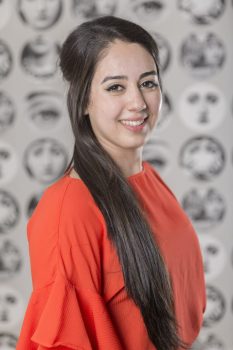 As the account manager for the Upcyclecentrum in Almere, Hede Razoky has a strong focus on creative entrepreneurship and the connection of (external) parties to the Upcyclecentrum in the common goal of a ‘world without waste’.
As the account manager for the Upcyclecentrum in Almere, Hede Razoky has a strong focus on creative entrepreneurship and the connection of (external) parties to the Upcyclecentrum in the common goal of a ‘world without waste’.
Educated as a sociologist at the University of Groningen, she began her professional career at a smaller municipality, where she succeeded to transform the local waste policies towards a system founded on the social incentives for waste separation.
Hede believes in creating a sustainable world and the important role of the younger generations in this goal. That’s why in addition to her role of account manager, she is active as a board member of the young division of the NVRD: an organization that connects professionals in the waste sector of the Netherlands.
Interview Transcript
Provided by AI – add 3:47 mins for the finished episode
Catherine Weetman 01:57
Hede, welcome to the circular economy podcast.
Hede Razoky 02:01
Thank you, Catherine for having me.
Catherine Weetman 02:04
Yeah, it’s great to see you. And I’m curious to know a bit about your background and how you came to work at the upcycle. centre.
Hede Razoky 02:12
Yes. So when I was I started sociology. So that’s something very different than what I do now. When I was younger, I was always interested in people and how they behave, how they acted. And that’s actually the reason why I studied sociology. And I never expected to end up in the waste industry. But yeah, here we are. When I graduated from my studies, I started working as a trainee at a much smaller municipality, but in the same province that Almere is also in at the province of Flevoland. And that’s actually when I came in contact with waste and the waste industry. And that’s also when I came in contact with the Upcycle Centrum. And I remember very vividly that I had a meeting with a semi private organisation that collects waste. And they do that for about around 23 municipalities. And I had a meeting there. And I remember meeting an older man who told me, so yeah. Is this your first time? In the waste industry? I say yes, I am very interested. It’s very fascinating. And they looked at me and he told me, once you start here, you will never go back. And I thought, Okay, this man is quite a bit silly. He doesn’t know what he’s talking about. He’s old. I’m young. I’m interested in so many different topics. I want to do something with people and how they behave. And more in that area. But yeah, looking back, he was right.
Catherine Weetman 04:14
‘Cause you’ve been hooked on waste ever since.
Hede Razoky 04:16
Yeah, yeah. It’s like, yeah, you don’t get rid of that of that excitement and that feeling that you get with with waste? It’s very weird to say that but yeah.
Catherine Weetman 04:32
So so so tell us more about the Upcycle Centrum, then, you know, where is it? Why does it exist? What’s Yeah, what’s the what’s it all about?
Hede Razoky 04:43
So the Upcycle Centrum is located in Almere business park only at Haven and Almere, the municipality of a mayor wants to be a circular city and the Upcycle Centrum is one of them. One of the initiatives that contributes to that goal and the Upcycle Centrum is basically the flywheel of the circular local Circular Economy of Almere. And it’s not your typical or traditional recycling platform, you can basically divide the Upcycle Centrum in three parts, we have the recycling platform, three workshops for three startups and an Experience room where you can experience that.
Catherine Weetman 05:36
Great, so I really like that phrase, the flywheel of the circular economy for Almere. But yeah, tell us a bit more about the three different parts then. So the entrepreneurs, and we’ve already interviewed Laura Meijering, of Unravelau, who’s one of the entrepreneurs. So tell us a little bit more about the others what what they do and how that’s circular?
Hede Razoky 06:00
Yeah. So in total, we’ve had six entrepreneurs. And the first three were Ruig en Geroest, Ruik and Seefd. Ruig en Geroest, it basically translates as rough and rusty. He was an entrepreneur who made interior articles. And he’s also the one that made our lamps. In our experience room, he did that with boilers and pressure Valley vessels. Then we have Ruik which translates into smell, they made perfume out of waste, and they used our plastics to make their perfume bottles. And lastly, we also have Seefd and she saved clothing that was brought in by giving them a new print and therefore a new life. And at the end of 2019, they left and these are the three new businesses move in and Laura is one of them from Unravelau. Well, we have also Isolde de Ridder Sieraden and Sieraden means jewellery. And she’s a circular Goldsmith. And she makes jewellery out of waste. And she also tells the yucky side of bling. Actually, that’s quite interesting story that she has. And she tells that
Catherine Weetman 07:31
the what side of the ugly side of bling, bling and gold and silver and the mining process, right? Yes, I know a little bit about gold mining but I can imagine there are similar problems in lots of other mining as well. Absolutely. And, and so sorry, what which was the third one I interrupted.
Hede Razoky 07:56
3-cycle, okay. And they have designed the shredder bike. And with the with that bike, they shredder plastic, and they melt plastic and make new products, such as cutting boards, knives, etc. And all the entrepreneurs make very high end products, and they have excellent quality. And they truly show that waste. It’s not waste, but the resource in the circular economy. And most people think that waste is dirty that secondhand products are dirty, but they show that the products that they make is very high quality is fresh, clean, is very modern, and it opens people’s eyes about waste, and secondhand. And you name it.
Catherine Weetman 08:52
Hmm. Yeah, there’s some really interesting examples there in all sorts of different sectors. And I know when we spoke before header, we were talking about the perfume business. And first of all, I hadn’t realised that they were also using recycled plastics for packaging, which is great. But they had a range of perfumes, didn’t they and one of them was using discarded rose petals from one of the biggest rose exporting businesses in in in, in the Netherlands. And also they’d used waste Christmas trees and all sorts of things like that. So they’re really demonstrating how something that’s about to be discarded can instead be turned into a really valuable, desirable product.
Hede Razoky 09:44
Yeah, yeah. And something that is very high quality. I think that’s also important to note that it’s not something that is it starts with very Low a column economic value, but they turn it in something that has a high economic value. And they create new ways of thinking in the economy. And I think that’s also very interesting. Interesting to note that it’s not only upcycling the waste, but if there’s a whole world around it that they affect,
Catherine Weetman 10:24
exactly. And it can make the the feedstock business more viable as well, can’t it? Yeah. A while ago, I was listening to Dr. Gunter Pauli talking about some of the projects he’s involved in. And he was talking about coffee plantations. And some of the ways that farmers are now able to use the, the coffee cherry, which is the kind of outer casing which is more than 40% of the the volume of what they’re producing. And yet in the past, it all had to go to waste. Because it’s a high volume waste, and it’s quite acidic, it was no good for composting, and just caused, you know, lots of lots of problems if it was left on the farm. Plus, it was very bulky, so moving it away from the farm was expensive and beyond the means of most coffee farmers. So instead, they’ve been developing ways to convert the coffee cherry into things that can go back into food and drinks and so on. And again, it’s become a high value product, because it’s actually full of really valuable nutrients that aren’t in the coffee bean. So this this kind of way of understanding the the full value of what’s going through the supply chain. And making sure that that value is being realised, and also being shared more fairly, I think is really important. And, you know, discoveries like these, the kind of, you know, making perfume out of waste Christmas trees and making making jewellery out of waste and all that kind of thing. It starts to change people’s mindsets about what what’s going through their own supply chains, and how that could be turned into more valuable outputs.
Hede Razoky 12:17
Absolutely.
Catherine Weetman 12:19
Yeah. So So that’s, that’s interesting. So the entrepreneurs, can they stay for longer than a year or so? Or is it just a fixed time thing? And then there is there’s water competition for the next group? How does that work,
Hede Razoky 12:34
they can stay a year and a half with us. And then we start looking for new entrepreneurs, because we want to give them a boost to start their business. But then they have to go do their own thing. And we tried to help other startups with their plans. And actually, we are starting to search for new entrepreneur in February, louder will leave us and then we will have to have a new startup for her workshop. So we we get attendance and people can Yeah, write us their plan. And then we searched the best three plants and they have to pay is a page and then we choose the best one. And we look at the flow that they are targeting the waste flow that they are targeting, because we want to show our residents that every free waste flow that they bring in, that we can do something else about with it. So we don’t like to have like three entrepreneurs that tackle textiles, because that that wouldn’t be interesting. So we look at what kind of entrepreneurship entrepreneurs that we have, what kind of waistbelt did they tackle? And are there entrepreneurs that can tackle something else so we can give our residents another example of what we can do with waste?
Catherine Weetman 14:07
Yeah, so it’s all about firing people’s imaginations in different directions.
Hede Razoky 14:12
Yes, and also one of the two most important concepts that you can find in the Upcycle Centrum is making things visible and tangible that though these concepts are so important, it’s not only you can not only find it in the activities that we develop, but also the walls of the Upcycle Centrum itself are built with the notion of circularity and making that visible and tangible. So it’s very important that we show people what what it is. We have a saying in, in Dutch that goes like you can talk about it till you weigh an ounce. So that means you can Talk about things but you can’t reach anything by it because it’s talking about me. Yeah, you do nothing about me. But if you show people, and you make it approachable, you make it visible, tangible, then you reach people, then you can change behaviour and change the mindsets of people because they can see it, feel it, smell it, taste it, you name it by the shells.
Catherine Weetman 15:24
Yeah, I believe believe it. And I suppose, remember it more easily. You know, we have all these different sensory elements to our memory, don’t we and and often having smelt something or touched it or used it in some way means that we’re not going to forget it. Whereas just just hearing somebody talk about it doesn’t have the same, the same effect? No, no. So you mentioned the walls of the Upcycle Centrum. And you also mentioned earlier some of the fittings in the experience rooms. So what are the experience rooms all about? And, you know, what are they used for? And what’s in them paint a picture for us?
Hede Razoky 16:12
Yes, so the Experience Room is a room that’s fully upcycled. So everything that you see there is upcycled. We have for example, our floor is made out of 13,000 pieces of recycled wood, we have lamps made out of boilers and pressure vessels, our stools are made out of old scar rings, like everything that you see is upcycled. And we offer educational packages workshops in our experience room. And it’s also a place that people can rent, if they are looking for an inspirational room, because they are tackling their sustainability theme or something like that they come to us to have their meeting there. So it’s a very inspiring location. Because if you step into it, you are basically into the circular economy because Everywhere you look, you see products that are made out of waste. But But again, it’s waste, that’s become something beautiful and useful. Exactly. Exactly.
Catherine Weetman 17:34
So have you had any other any stories of people being in the experience room? And then you know, having that that revelation, that light bulb moment that’s inspired something?
Hede Razoky 17:46
Yeah, I have many visitors. That came after the tour that I gave them, or one of my colleagues, they can they then come to us and said, Oh, okay, so that’s what what you mean, when I talk about circular economy, this has opened my eyes, or they say, Oh, so you really do something with our waste, you turn it into something new, I will now separate my waste more properly, properly. So that’s very good to hear that if you show people that they have a reaction to it, and they have the reaction of, okay, so I want to be a part of it, I want to do better, I want to separate my waste more correctly, because I see that they can make something new out of it. So that’s very helping in not helping, it’s very reassuring in things that we are doing.
Catherine Weetman 18:50
And people will feel like just doing the extra little bit of, you know, keeping, keeping things properly separated and cleaning things that need cleaning before they go into the recycling and not contaminating it by putting something in that shouldn’t be there. They now feel that that’s going to actually make a big difference to the entrepreneurs and and the quality of the feedstock that they’re getting. So yeah, instead of it just being a kind of, you know, I do I do something and then I have no idea what happens to it. And yeah, yeah.
Hede Razoky 19:25
And and they and we make sure that we tell them that they have an important part in the process, that it’s not only the entrepreneurs, but they are a critical part of the whole process. Because we show them. We show that all on our roof, you bring our your waste or entrepreneurs pick it out and they upcycle it and in the experience room. We then show them what we have made out of it. And that’s also important to make them a part of it, that it’s not something that’s outside there. outside their reach?
Catherine Weetman 20:03
Yeah, yeah, this is this is all of our, it’s it’s a system that we’re all part of. And we’re all responsible for what? For what goes in and the value of what comes out? Excellent. So what what about what’s next? Have you got any new, new exciting projects in the pipeline?
Hede Razoky 20:23
Yeah, so, um, two exciting things that I want to talk about. One of the activities that we we are working on is facilitating more entrepreneurs. So we want to upstate upscale our activities and upcycle more waste. And we have, as I told you, three entrepreneurs within the Upcycle Centrum, but the amount that they upcycle is little, so we want to upcycle more ways. And two of my colleagues are working on pilots, where they are researching the possibilities to give other entrepreneurs the opportunity to get access to our waste. Because currently, only the three entrepreneurs that are with us have access exclusive access to our resources, because the law and regulations in the Netherlands bro habits us to give our resources to entrepreneurs that are outside our thresholds. So they are looking at possibilities to break that wall and help more entrepreneurs because they are literally knocking on our door for our resources, because they show us what they can make out of it. And they are finding ways to get the resources directly from people. But it will be more nice if they can come to us and get the resources directly from us.
Catherine Weetman 22:07
Yeah. So I guess those issues of you know, restrictions around what you can do with waste probably apply across the whole of Europe and in many other countries as well. But what I find is brilliant is that you’ve got some entrepreneurs knocking on your door saying can we have access to this waste, it just shows how things are, you know, turning a corner, and that people are getting inspired and people are able to start artisan and craft businesses and another kind of more more industrial type businesses, all on the back of things that we were just discarding and, and wasting. So that’s, that’s, that’s so inspiring. And, and so encouraging. Given given the the slow progress, it feels like we’re making. Yeah, absolutely. Yeah. So coming back to you Hede, and thinking about, you know, going back to where we started, and what you love about your, your work, and so on. Which of your values do you think helps to move us towards a better world one that’s more sustainable and fairer?
Hede Razoky 23:18
Yeah, I think I have thought about this one. And I think it’s honesty. In the first place, honestly, towards ourselves. Because I think we all like to believe that we are good people. And we care about people in the world, excuse me, around us. But still, everyday we make choices or purchases, that if we are completely honest, or not contributing to a better world. And yeah, that includes me as well. For instance, if I want to buy clothing, clothing for price, that raises some red flags, that believes it’s very, very easy to go on about your day and not consider the consequences. So I think it all starts with honesty towards ourselves, because I truly believe that, yeah, most of us want the best for our world and for our fellow humans. And I don’t want to get very spiritual but I believe that that there are good people hear that wants to do good.
Catherine Weetman 24:33
Yeah, and that’s, that’s interesting. And it puts a slightly different slant on the way that I think most people will think about their lifestyles and what they buy, I guess most people are perhaps looking for, you know, what’s the what’s the, the least problematic option, or what choice Could I make this you know that slightly better than the I’ve been reading a bit this week about a UK based fashion retailer called boohoo that if you’ve heard about them, but they get criticised for selling, you know, a dress for five pounds and people saying, you know, how can that possibly be right? From the ethical point of view of paying people to do that, as well as the cost of sit, you know, cheap materials going into it. But I guess people are then thinking, well, if I know boohoo is bad, but I buy from h&m or wherever, that’s slightly better, so that’s okay. But yeah, but the way that you phrased it is entirely different. What can I do that that’s going to contribute to a better world? And that might lead you to think that well, on this occasion, I won’t buy anything, or I might rent instead, because, you know, I know, I’m only going to wear this thing once or twice. And if I rent it, then it can, can go back. So think about is what I’m going to do going to make a better world instead of what can I do? That’s a bit less bad than the than the thing I did last time. Yeah, is a different way of looking at it isn’t that and, yeah, I think you’re right, we do. I’ve just been reading a book, that’s, that’s been around for quite a while, it’s been updated a few times called willful blindness by Margaret Heffernan. And that has all sorts of different reasons she goes through as to why we’re not truthful, to ourselves. And the aim of the book is just to help us spot all those scenarios where we can be deluding ourselves, and then you know, pick ourselves up. And that might be you know, in a work situation with whistleblowers and so on. There’s a really interesting one there, where she quotes lots and lots of research, to back up the thesis of what she’s saying. And so there’s research that says, whenever money questions or finance come into conversations, all over ethical considerations get dismissed, is something about bringing money into the decision making progress process that crowds out all other sorts of moral considerations. And I found that a shocking, but then be really interesting, and then start thinking, well, how would you avoid that happening? You know, what processes Could you go through that avoid that being part of business decision making? Because it could be you know, that there’s a 1% saving to be had by doing something that’s completely unethical, or, you know, where you’re washing your hands of responsibility further up the supply chain, just for a small saving? So how could you avoid that scenario coming up? So that that’s the route that you go down? So thank you. And who would you recommend as a future guests for the programme? I’m guessing you’ve been inspired by lots of these entrepreneurs at the Upcycle Centrum? So yeah, who would you like to like us to talk to?
Hede Razoky 28:10
I think, so. Yeah, as the account manager, I, I represent all the previous and current entrepreneurs, and of course, I’m proud of them all equally, and choosing between them is like a mother choosing her favourite child, actually, that feels like that. But I think I’m convinced that each and each and every one of them have their unique story regarding their way of upcycling and their views within within the circular economy. So, yeah, I would recommend one of the six entrepreneurs that we that we had, and that we talked about.
Catherine Weetman 28:53
Great. So I’ll email afterwards to get some of those contact details. Because, yeah, I’m fascinated by quite a few of those, those ideas and stories, and I think it would, would be really interesting to find out how they got started, and you know, where they got the ideas from, and how they’re creating value from waste. Thank you. And Hede, how can people find out more and get in touch with you and the Upcycle Centrum?
Hede Razoky 29:21
Yes. So people can find us on social media on Instagram or LinkedIn. And they can find us via the name of Upcycle Centrum Almere, or they can contact us via mail. Our email address is upcyclecentrum@almere.nl. Or they can connect with me on LinkedIn and ask their questions. There are so different ways to contact those.
Catherine Weetman 29:56
Thank you. And just to spell that out, so that’s upcycle Centrum, so C e, n, t r u m. Yes. So not Upcycle Centre, as we would say it in the UK. And Almere is a l, m e r e. But I’ll put all those links in the show notes at circular economy podcast.com. So people can look them up. And maybe we’ll be able to put links to the entrepreneurs, businesses as well. That would be great. Excellent. Well, thank you very much header. I’m really pleased that Laura puts us in touch and recommended you as a guest. And I think what the Upcycle Centrum is doing is absolutely inspiring. I could see it being applicable to every town around the world. It’s a brilliant way of fledging new businesses, as well as getting people more engaged with why we shouldn’t be wasting things and why everything should stay in the system so we can create value out of it instead of losing all those embedded resources, the energy, the water, and of course the human knowledge and and labour that went into creating the product in the first place. Thank you very much.
Hede Razoky 31:06
Absolutely. Yes, absolutely. Thank you so much, Catherine, you as well as for this lovely conversation.
Catherine Weetman 31:13
Thank you.
Want to dig deeper?
Why not buy Catherine’s award-winning book, A Circular Economy Handbook: How to Build a More Resilient, Competitive and Sustainable Business. This comprehensive guide uses a bottom-up, practical approach, and includes hundreds of real examples from around the world, to help you really ‘get’ the circular economy. Even better, you’ll be inspired with ideas to make your own business more competitive, resilient and sustainable.
Please let us know what you think of the podcast – and we’d love it if you could leave us a review on iTunes, or wherever you find your podcasts. Or send us an email…
Podcast music
Thanks to Belinda O’Hooley and Heidi Tidow, otherwise known as the brilliant, inventive and generous folk duo, O’Hooley & Tidow for allowing me to use the instrumentals from the live version of Summat’s Brewin’ as music for the podcast. You can find the whole track (inspired by the Copper Family song “Oh Good Ale”) on their album, also called Summat’s Brewin’. Or, follow them on Twitter.
